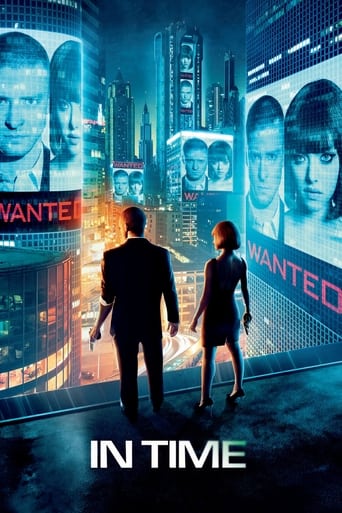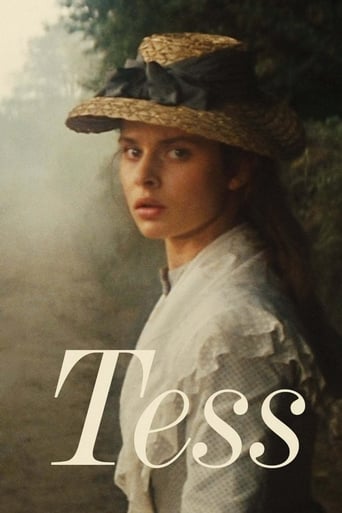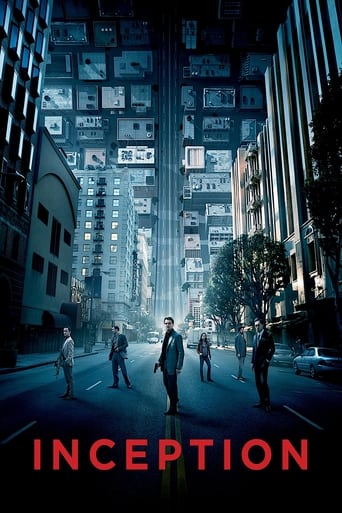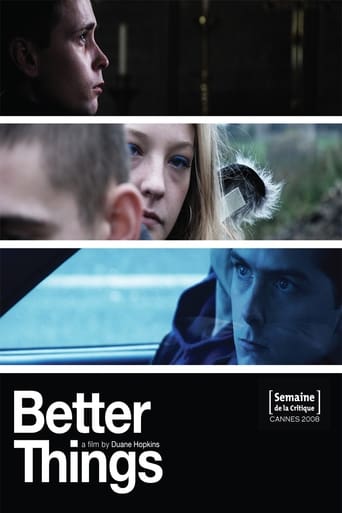


Better Things
Gail's agoraphobia keeps her inside where she escapes into romance novels. She shares a house with her Nan, recently back from the hospital. Gradually, they both try to reach out to each other to break their isolation. Rob plunges further into his addiction as a way of numbing his heartbreak over the death of his girlfriend. In his stupor, he dreams of embracing her again. Mr & Mrs Gladwin are going through a shift in their 60 year relationship. Years of resentment and unspoken truths have built a barrier between them that Mrs Gladwin, in her abiding love, tries to erode in little gestures.
-
- Cast:
- Michael Socha , Patricia Loveland


Similar titles

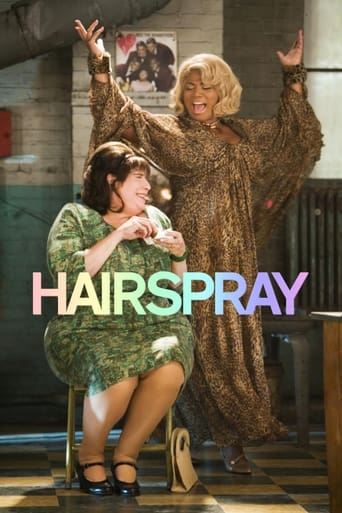
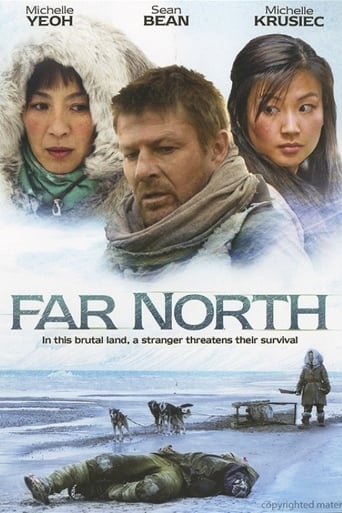
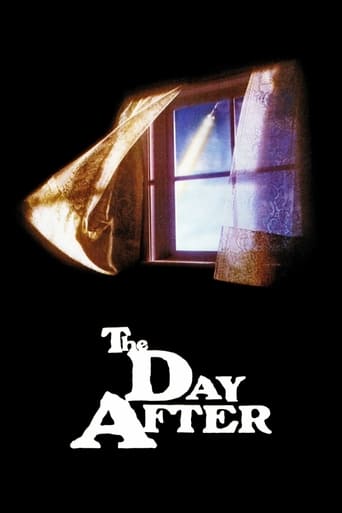
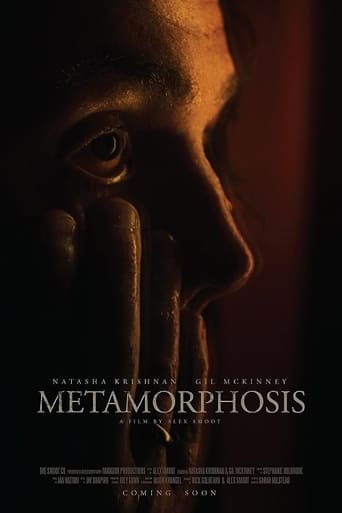
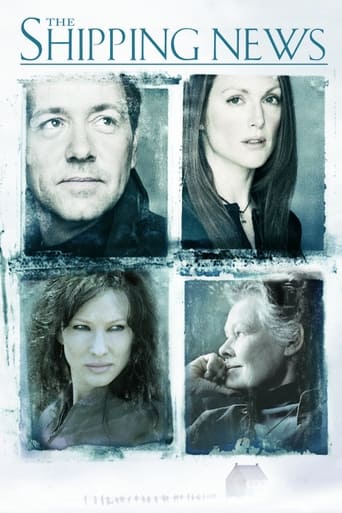
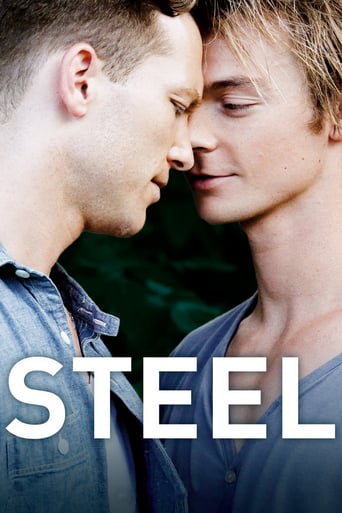
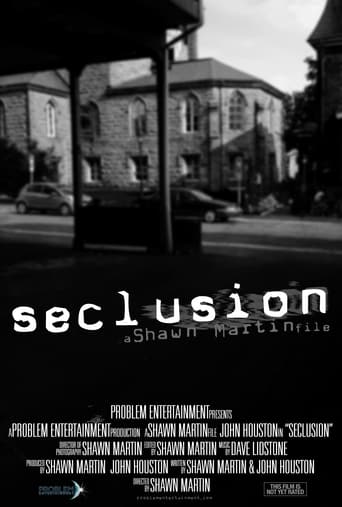
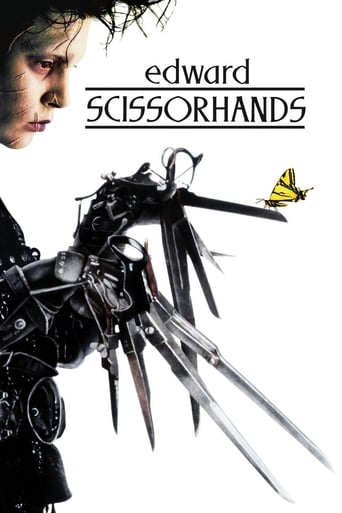

Reviews
Thanks for the memories!
Captivating movie !
One of the worst ways to make a cult movie is to set out to make a cult movie.
The film's masterful storytelling did its job. The message was clear. No need to overdo.
Although I understand what the writer/director is trying to do with this debut, I just felt massively underwhelmed by the project. It also feels too lengthy and dragged out. If the stories were told a little faster and with some stronger actors, I'm sure I would have been pulled into their dark, stormy worlds.A good start grabbed me attention wise and I wanted to know where the characters were going but there is only so many long shots of an every-day scenario you can take before it becomes something akin to looking at a photograph intently for 10 minutes when you've seen the same photo 5-times before.The old couple were particularly poignant but the other characters didn't capture the mindset excessively or vividly. An interesting debut for someone who must have had good backing and I think it could have been snappier and shorter and still retained its gritty teeth.Direction can, indeed, make a film as much as good acting can overhaul dodgy directing. However, 'Better Things' doesn't live up its positive title. I understand the irony/play on that title but even in the depths of reality and creeping inside the corpse of drug abuse, I wanted a lot, lot more to happen and a lot more to get me thinking about.
The photographer and filmmaker Duwne Hopkins' Better things is rather ironically titled: its people are hardly moving toward improvement in their bleak lives, though they might like to. They live in a marginal community in the English Cotswolds that seems to be dominated by adolescents and old people. All of them are either depressed, or addicted to drugs, or just old, run down, idle, or lost. Most are desperately hoping for love, but unable to find it. Hopkins, who has made some celebrated short films on related topics, is a native of the area and is careful to use local people, including former drug addicts. Faces seem harshly real, light is sculpted, landscape panoramas are dark and painterly.The shock here is that we're in the lovely English countryside, but it's full of urban problems: poverty, unemployment, drug addiction. There is no Hollywood glamor or Trainspotting wild style about these young addicts. The eye is poetic but the stories are sociological realism.A young woman named Tess (Emma Cooper) dies of an overdose, and those who remain don't seem better off, with a few exceptions: an estranged old couple gradually becomes reconciled, a girl overcomes her fear of leaving her room, and the boyfriend screws up the courage to visit the dead girl's mother.That boyfriend, Rob (Liam McIlfatrick), as well as David (Che Corr) and Jon (Freddie Cunliffe) all did heroin with Tess, although David, due to the influence of girlfriend Sarah (Tara Ballard), is half-heartedly trying to stop. Rob is struggling, not least with his inability to attend Tess's funeral because of his complicity in her death. Jon's grandfather (Frank Bench) is released from the hospital and when he returns home--in some of the bleakest scenes of marital shutdown ever filmed--avoids his poor old wife (Betty Bench). His anger is never explained, but he does eventually let it go. Tess's friend Gail (Rachel McIntyre) missed the funeral because she has become phobic about leaving her room. Her grandmother (Patricia Loveland) has a hard time getting her to get up in the morning. She is taking a new medication, a therapist or social worker makes a home visit, and she improves after a look at the stormy fields and trees outside with her failing "nan." The plot lines include 18 characters. As one reviewer has noted, the three young male leads are hard to tell apart; and so are some of the names. The meandering sequences tend to seem random, even when artificially linked by sound or image.Despite the integrity, something is missing--perhaps just stylistic restraint. Blue-tinted, carefully planned images of inertia are jarred awake by abrupt shock editing in which cross-cutting of similar moments and shifts from silence to noise are used a little too freely. I began to think the film would have worked better if the main stories had been followed through in separate sections instead of shuffled together--if, in short, Hopkins had worked in a simpler documentary style, let characters and scenes play out, and made space for more motivation and movement than simply waiting to score or racing at breakneck speed on a country road. The stylistically overwrought manner doesn't allow sequences and characters to breathe and detracts from the authenticity of the content, which, however mired in stasis, seems richly textured. There is a talent here that is at war with itself.Shown in March 2009 as part of the Film Comment Selects series at Lincoln Center, New York.
...Bruno Dumont. I've read a lot of reviews lauding this supposedly great example of British art-house cinema. Even Sight and Sound made it film of the month. But the facts are simple, everything about it says the filmmaker is in thrall to the work of Bruno Dumont, particularly La Vie de Jesus and L'Humanite. And why not, they are magnificent films.Unfortunately it only goes to highlight the miserable state of British art-house and British film-making in general that this is held up as a fine example of it when all it does is rip off the style and downbeat content of Dumont's great works. For the unforgiving Northern France landscape of Dumont substitute the Cotswolds and you've got it.In fact its worth pointing out that the similarities in the prolonged static widescreen shots and the dull grey cinematography, so perfectly mimic L'Humanite especially that one would almost believe the filmmaker had had the audacity to give the colourist a copy of that film and then have him match the shots one by one.But no filmmaker could be that cynical or unoriginal. Could they? 2 stars for the perfectly copied photography.
When you were little, did you ever hide under the bedclothes? Pretend everything outside doesn't exist? And as a teenager. Hide your head in a pillow - after the broken love affair? And now?Duane Hopkins' first feature is bleak yet intellectually satisfying. Bookended with nothingness. Is that emptiness and the spaces in-between are they brought on by loss? Or is it a basic condition?Better Things uses narrative arcs but strips away story lines to make us examine such questions. Producing serious dramatic tension with such a bare palette is a remarkable achievement. Take Gail. She has agoraphobia. It keeps her indoors. Escaping within romantic fiction. Nan shares the same house. A world away. Mostly bedbound. Can their communication ever be more than, "a nice cup of tea?" Or Mr and Mrs Gladwin. Together for 60 years. Much of it unspoken. Or teenagers filling a sense of isolation with hard drugs. Maybe dying. More loss. A bridge no longer crossable. Tess, dead in the opening scene. A needle still stuck in her arm. Lost souls on a sea of oblivion. Each crying out with the tiniest of lights, the tiniest capacity for love. A still breath in the vacuum.No trite 'love is the answer' will catapult this film to fulfil any needs for feelgood fantasy. Surprising perhaps, when love is very central to the film. Says its director, "It is of course what all of them are looking for, it is what they want and need, as we all do. But it is more complex than just finding it and receiving it, it is about whether you can accept it. Either because it seems impure or compromised from this person or you feel not deserving of it yourself. The emotion has a huge value to them but it does not mean that it can solve everything for them. It is not just love that they crave; it is security, safety, and validation of their own worth. They need to feel that they have a greater responsibility."A penetratingly realistic approach, combined with avant-garde technique in composition and structure, gives Better Things its weakness and strength. I cannot imagine it satisfying mainstream audiences, even before we come up against graphic drug use (and some of the actors are former users). I was feeling ready to dismiss it. But then it comes together so coherently. Hopkins is no dilettante parading style over substance. He picks a complex, abstract idea as his theme. He obsesses (in a good way) about theme over story. More mainstream film-making would parade its 'themes' yet coyly duck real concerns.In that great film, The Diving Bell and the Butterfly, for instance, a 'theme' of 'being trapped' is approached by comparing a quadriplegic, a Beirut hostage, and an old man with problems navigating stairs. We could feel some artistic elation at perceiving the 'underlying message'. But in fact the audience was free to ignore such subtlety by concentrating on life-stories, beautiful photography, and enjoyable emotions overcoming extreme adversity. Such niceties play to the desire to be entertained without recognising the mundane misery of being trapped - much less the possibility of better things for most mortals."I'm interested in what the story represents," says Hopkins. "The more story you remove, the more theme is left because the audience has to work harder." And the more I thought about it, the more it made sense. As long as the director isn't being deliberately obscure (and this one isn't), there's a sense of achievement and understanding which is a pay-off for the effort. Individual characters have limited relevance to our own lives. But the theme is usually more universal. By working on it we also make it something we own. And if Hopkins can go on to 'even better things still', then theatregoers may be treated to his examination of other deep issues. Will this bold approach take wings like Godard or will Hopkins remain welded to rural grunge?Regarding the structure of the film, he says, "The drama in Better Things comes from a gradual build up of scenes that relate to, and complement each other thematically and build an impression of an area, it's inhabitants and their individual stories through these sequences." As a setting, it also becomes the unifying element, where lives are probably shared even if not in the narrative. Better Things is set in the Cotswolds. This 'Green and Pleasant Land'. The England most city-dwellers romanticise. The England where country-dwellers increasingly find themselves marginalised.Isolation is cleverly emphasised with neat stylistic touches. An almost total absence of panning and tracking shots gives the impression of a gulf between each mise-en-scene. There is a lack of camera movement, just as subjects find it hard to move towards each other, physically and emotionally. The stillness, the inability to move forward, seems to overpower everything else. And, when two boys are driving in a fast car, the soundtrack suddenly blots out the loud engine sound, leaving only their words and inner reality. An inner reality perhaps plunging headlong to the abyss.I am neither a celebrity or a drug addict. Probably like you, I try to find better things. Maybe it's in the simple joyous laughter of a friend as we share a glass of crisp wine. Birdsong outside my door reminding me of the countryside. The rustle of wind in the trees somehow recharging my batteries. Or the warm smile and embrace of a lover. Even if the affair is only desultory. We long for better things. And the empty space in which they are found remains a mystery. Someone asks, do I use films as an escape? If I do, creative films of this calibre risk giving Britain a good name.


